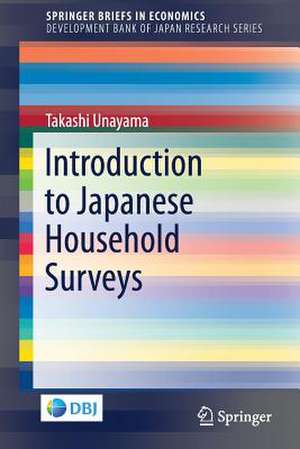Introduction to Japanese Household Surveys: SpringerBriefs in Economics
Autor Takashi Unayamaen Limba Engleză Paperback – 22 ian 2018
Din seria SpringerBriefs in Economics
-
 Preț: 444.35 lei
Preț: 444.35 lei -
 Preț: 264.79 lei
Preț: 264.79 lei - 15%
 Preț: 462.51 lei
Preț: 462.51 lei -
 Preț: 47.33 lei
Preț: 47.33 lei -
 Preț: 353.14 lei
Preț: 353.14 lei -
 Preț: 273.32 lei
Preț: 273.32 lei -
 Preț: 376.04 lei
Preț: 376.04 lei -
 Preț: 379.09 lei
Preț: 379.09 lei -
 Preț: 380.07 lei
Preț: 380.07 lei -
 Preț: 377.35 lei
Preț: 377.35 lei -
 Preț: 379.09 lei
Preț: 379.09 lei -
 Preț: 376.59 lei
Preț: 376.59 lei -
 Preț: 408.27 lei
Preț: 408.27 lei -
 Preț: 379.09 lei
Preț: 379.09 lei -
 Preț: 383.27 lei
Preț: 383.27 lei -
 Preț: 378.54 lei
Preț: 378.54 lei -
 Preț: 377.95 lei
Preț: 377.95 lei -
 Preț: 340.23 lei
Preț: 340.23 lei -
 Preț: 380.25 lei
Preț: 380.25 lei -
 Preț: 378.12 lei
Preț: 378.12 lei -
 Preț: 376.04 lei
Preț: 376.04 lei -
 Preț: 376.04 lei
Preț: 376.04 lei -
 Preț: 379.68 lei
Preț: 379.68 lei -
 Preț: 381.00 lei
Preț: 381.00 lei -
 Preț: 375.23 lei
Preț: 375.23 lei -
 Preț: 376.80 lei
Preț: 376.80 lei -
 Preț: 378.54 lei
Preț: 378.54 lei -
 Preț: 377.57 lei
Preț: 377.57 lei -
 Preț: 376.04 lei
Preț: 376.04 lei -
 Preț: 378.92 lei
Preț: 378.92 lei -
 Preț: 375.62 lei
Preț: 375.62 lei -
 Preț: 379.09 lei
Preț: 379.09 lei -
 Preț: 353.67 lei
Preț: 353.67 lei -
 Preț: 342.14 lei
Preț: 342.14 lei -
 Preț: 375.45 lei
Preț: 375.45 lei -
 Preț: 379.09 lei
Preț: 379.09 lei -
 Preț: 377.35 lei
Preț: 377.35 lei -
 Preț: 344.86 lei
Preț: 344.86 lei -
 Preț: 377.35 lei
Preț: 377.35 lei -
 Preț: 345.89 lei
Preț: 345.89 lei -
 Preț: 377.57 lei
Preț: 377.57 lei -
 Preț: 343.83 lei
Preț: 343.83 lei -
 Preț: 378.12 lei
Preț: 378.12 lei -
 Preț: 345.06 lei
Preț: 345.06 lei -
 Preț: 379.48 lei
Preț: 379.48 lei -
 Preț: 379.48 lei
Preț: 379.48 lei -
 Preț: 380.07 lei
Preț: 380.07 lei -
 Preț: 375.45 lei
Preț: 375.45 lei -
 Preț: 445.33 lei
Preț: 445.33 lei -
 Preț: 378.54 lei
Preț: 378.54 lei
Preț: 375.45 lei
Nou
Puncte Express: 563
Preț estimativ în valută:
71.84€ • 75.20$ • 59.80£
71.84€ • 75.20$ • 59.80£
Carte tipărită la comandă
Livrare economică 31 martie-14 aprilie
Preluare comenzi: 021 569.72.76
Specificații
ISBN-13: 9789811076794
ISBN-10: 9811076790
Pagini: 67
Ilustrații: VII, 64 p. 13 illus.
Dimensiuni: 155 x 235 mm
Greutate: 0.12 kg
Ediția:1st ed. 2018
Editura: Springer Nature Singapore
Colecția Springer
Seriile SpringerBriefs in Economics, Development Bank of Japan Research Series
Locul publicării:Singapore, Singapore
ISBN-10: 9811076790
Pagini: 67
Ilustrații: VII, 64 p. 13 illus.
Dimensiuni: 155 x 235 mm
Greutate: 0.12 kg
Ediția:1st ed. 2018
Editura: Springer Nature Singapore
Colecția Springer
Seriile SpringerBriefs in Economics, Development Bank of Japan Research Series
Locul publicării:Singapore, Singapore
Cuprins
1 System of Japanese Household Surveys.- 2 How Reliable Are Japanese Household Surveys?.
Notă biografică
Takashi Unayama is an Associate Professor at Hitotsubashi University and visiting scholar of the Research Institute of Capital Formation, Development Bank of Japan. Born in 1974, he received a Bachelor’s degree in economics from University of Tokyo in 1997 and a Ph.D. in economics from University of Tokyo in 2004. He worked for Keio University, Kyoto University, Kobe University, and Ministry of Finance before joining Hitotsubashi University.
Caracteristici
Provides comprehensive information on Japanese household surveys to help researchers choose appropriate data sources Shows the connections between theoretical household behavior models and actual survey data Compares surveys to show cross-consistency for the evaluation of their reliability
